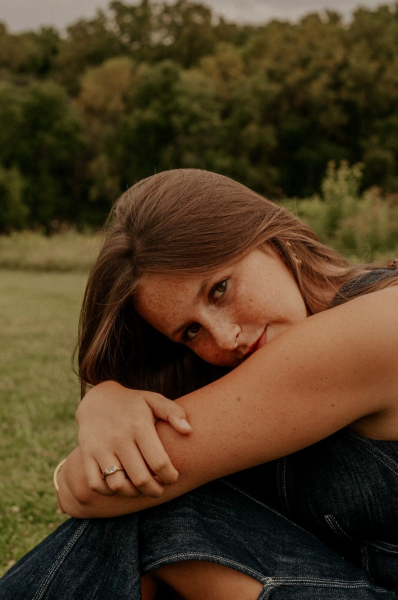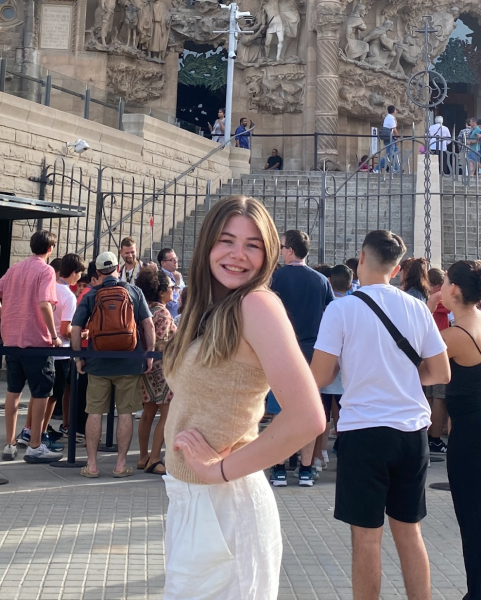
Colleen Hoover’s New York Times bestselling novel “It Ends With Us” has been refashioned into an all-star film featuring big-name actors Blake Lively and Justin Baldoni. However, the much-anticipated film is receiving major backlash from viewers with claims the film’s branding as a romance is downplaying domestic violence.
Hoover has publically shared that her narrative draws on her own parents’ relationship. The novel was inspired by her mom leaving her abusive husband, Hoover’s biological dad, when Hoover was just 2 years old.
The film tells the story of florist Lily Bloom and neurosurgeon Ryle Kincaid. After the two abruptly meet, they quickly launch into a deep, romantic relationship. As their relationship progresses, Kincaid rapidly turns from charming and captivating to physically and emotionally abusive. The worst of this includes Bloom being pushed down a flight of stairs and attempted rape.
School counselor Ellie Thomas reflects on the depiction of Bloom and Kincaid’s relationship within the film. “The movie seemed to me to romanticize the idea of domestic violence as a form of loving too hard, and making the decision to remove yourself from an abusive relationship as an option. My hope, for all of our students, is that they fully understand violence of any kind is not a form of love,” said Thomas.
As the feature film depicts a highly sensitive subject, it would only make sense for the marketing of the film to match the tone; yet, producers failed to do just that. Trailers for the film have been deemed extremely misleading and possibly harmful to viewers as no trigger warnings are displayed. Instead, the trailers for the film depict the abusive love story as a light-hearted, family-friendly rom-com.
Abuse advocate and survivor Ella Hurst speaks out against the poor marketing of the film. “As a survivor of trauma- I understand the importance of advocacy, and representation. Based on my experiences, the marketing of ‘It Ends With Us’ caused viewers who never read the book to be blindsided and more importantly survivors of domestic violence,” she said.
The film’s release critics have not only taken issue with the misleading advertisement of the film, but also with Lively’s attitude towards the film.
The production’s misleading marketing tactics are emphasized by Lively’s infamous statement to “Grab your friends, grab your florals and head out to see it.” Quickly, this statement received loads of backlash criticizing the tone with which Lively light heartedly promoted a heavy topic as a fun hangout opportunity. Fans suggest Lively had a greater obligation to bring awareness to the main conflict in the movie: domestic violence. Instead, Lively could have simply told fans to wear purple, the color associated with domestic violence awareness.
Lively chose to focus interviews on promoting her haircare brand and explaining her thought process behind Lily Bloom’s outfits. Lively’s hair care brand, Blake Brown, became a large part in the marketing of “It Ends With Us.” Lively uses her brand’s products to style her hair in the movie and hosted hair promotion events as part of the movie press.
Lively’s hair care business is not the only example of her inability to separate her acting career from her business endeavors. Lively posted a picture of her posing in front of a cart reading “Fresh Flowers & Fizzy Refreshments” on her socials and sent a promotional email showing how to make an “It Ends With Us” themed cocktail using her alcoholic beverage brand, Betty Buzz.
Many fans found her self-promotions to send a tone deaf message. In a movie that’s marketing should spread awareness and access to resources for domestic violence victims, Lively seems to focus on bringing attention to her haircare line.
“With the large platform this movie was given it should have been used to raise awareness and give survivors a safe place to share their stories,” Hurst said.
However, this does not mean Lively has said nothing about her character. Lively has spoken about the importance of seeing her character not only as a survivor but also as an individual with an identity separate from what happened to her.
After receiving backlash, Lively posted an Instagram story stating “Everyone deserves relationships free from domestic violence.” Her temporary post also included statistics about partner violence and a link to the National Domestic Violence Hotline.
Yet, fans deemed this too little too late.
Unlike Lively, many have praised Baldoni for his approach in promoting the film. Baldoni is seen as a voice of reason among the cast, keeping domestic violence the center of his interviews and statements.
“If a Lily Bloom in real life can sit in this theater and make a different choice for herself than the one that was made for her, maybe she sees herself on that screen and chooses something different for herself,” said Baldoni at the premiere interview.
Baldoni always dives deep into his projects. He prepped for months for his role, journaling from the perspective of Ryle taking acting classes and even attending support groups for abusers. Baldoni knew he needed to be able to portray a multidimensional character whose charm and lovability would show why people stay in abusive relationships.
However, it seems the main message of the film has yet to land as many short film Tik-Toks go viral for stating Ryle is “misunderstood” and should be forgiven. The mixed responses from viewers are a testament to the importance of properly representing relationship dynamics in media.











